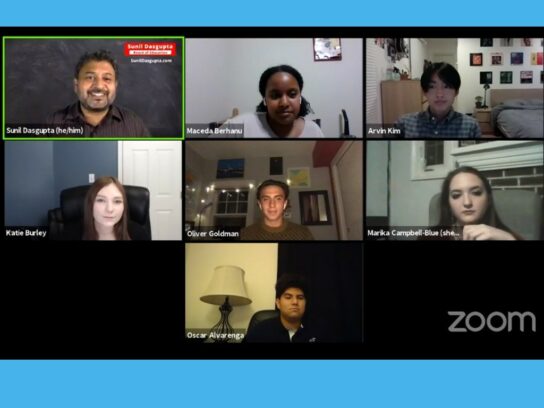

Sunil Dasgupta
Montgomery County Board of Education candidate Sunil Dasgupta talked with students from local high schools Thursday night about their experiences with virtual learning and what they think could be done better.
“I want to come out of this [pandemic] stronger. I want to come out of this not with the old normal. I want to come out of this in a very different place where we don’t have to deal with the old problems that we were faced with for long. And so, I need your help,” Dasgupta told the six students who spoke with him in a Zoom video call meeting.
“You are the most influential voice of change. I can shout and shout and say, ‘Oh, we got to change this. We got to change that.’ But when students say it, and you say it together. I think you have the greatest impact,” Dasgupta said.
The students in the meeting represented Montgomery Blair, Whitman, Gaithersburg and Watkins Mill high schools, and they were eager to participate in sharing their perspectives on what is working and not working for Montgomery County high school students.
Many voiced that having no school on Wednesday has benefitted students, giving them breaks from looking at the computer screen and allowing them to catch up or complete their work from previous days.
A student’s mental health also improves from having this break during the week, according to Gaithersburg junior Oscar Alvarenga.
“In school, I get very nervous and have anxiety. So when I was in school and having classes next after the next and having it every single day, it would sometimes make me a little nervous and a little sick sometimes,” Alvarenga said. “[Having no school on Wednesday] definitely helps me get to have a good break, and I can like, go outside and take walks.”
Students noted that many teachers are trying to do their best during these difficult times; but, it is a common experience among students to miss parts of the lecture because a teacher’s internet connection lags, glitches or fails altogether.
Some teachers do not notice when incidences like this occur, and students miss out on five minutes of the lecture and they have to interrupt the teacher to ask them to repeat what was missed, extending the lesson time and stressing out both students and teachers.
Dasgupta noted then that teachers sometimes lack the necessary bandwidth to provide a lecture without these interruptions.
Certain school subject areas are also more difficult to teach online than others.
“I think the obvious answer is that the physical sciences are harder to recreate in a virtual environment than like the social sciences,” said Oliver Goldman, a senior at Montgomery Blair and co-editor of Silver Chips, the school’s newspaper.
Math in particular seems to be very difficult for students via online learning.
Katie Burley, a senior at Watkins Mill and co-editor in chief of the school’s newspaper The Current, described how a friend in an AP calculus math class would take up to four hours attempting to maneuver the mouse to draw out the answers for her homework on the computer. Her friend complained to her saying that this type of homework could be completed in under an hour if only they could use a pencil and paper.
Students also felt that teachers need to be more transparent about the new attendance rules and policies. There is a lot of confusion about whether or not students must show up to their virtual classes or if they can watch recordings of the class and still be counted for attendance.
This was a major concern for students from all schools represented in the meeting because they said many students are now working to help with their family’s finances or they help take care of their siblings at home. This means if students think they are getting marked for so many absences then they may decide not to attend school at all.
Dasgupta brought up the topic about the requirement to have web cameras on for classes. All the students objected to the idea stating that many people can have their cameras on and yet still not be engaged in class, and those most vulnerable will not even turn on their camera and may not even log on altogether if there are camera requirements.
While the issue of requiring the web camera to be on during class has been a hot topic in Montgomery County, the lack of connection and acknowledgment from teachers with their students was the biggest concern and viewed by students as the major point of weakness in this new virtual learning environment.
The students expressed to Dasgupta that these high school years are their formative years, and engaging with their peers and especially the teachers is an important part of school that should not be overlooked.
The lack of effort of simply talking to the students about their day or current events impacts students’ motivation to learn, especially in a virtual setting.
“I think that, especially now, it’s so important that all of our teachers and everything that we’re learning is rooted in this, like, unprecedented time that we’re all living through and these challenging times that we’re all living through,” Goldman said.
Starting at 8:15 pm tonight. Students from Blair, Whitman, Gaithersburg, and Watkins Mills join the Thursday night chat. Join live on Facebook: https://t.co/05AfpgjHr5@MBHS_SGA @Silver_Chips @GaithersburgHS @GburgSga @wmorangenation @WMHSTheCurrent @bdubbsonline @MCRSGA https://t.co/MgzFGsD7Nw
— Sunil Dasgupta (he/him) (@sunildasgupta4) September 17, 2020
“And I think there’s just as much to learn like about who we are and about what we can do in this time then there is to learn about math. That’s not to say either or, but it’s to say both, and finding that happy balance and making sure that there’s a connection established. Once that connection is established, it also becomes easier to do something educational.”
Pressure and stress on teachers and students will continue to build up if the issues aren’t addressed now said Dasgupta.
“One of the things that really sort of saddened me a lot, is that we wasted much of the summer to prepare teachers to do this right. So I want to fix that. Now going forward, I am not even seeing any real sort of serious planning for reopening, and that is worrying me. Because if we don’t plan for reopening in February or whenever it is, if we don’t start now, we are not going to be able to do it right,” Dasgupta said.
Related Post:
MCPS Board of Education At-Large Candidates Offer Different Takes on Webcam Rule

